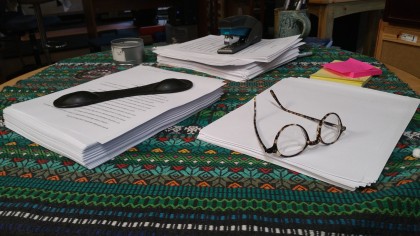Lughnasa Monsoon Moon

Yesterday and today are about reentering mountain world. Tired yesterday, probably today, too, from the journey. The electric panel needed a gentle push to return power to the eastern wall of Kate’s sewing room. E-mails needed to be sent back to the auld home, thank yous and follow ups. Pushed Superior Wolf out the door to an agent, the biggest toe I put back in the world of daily life, save one.
The biggest. Mussar Vaad Practice (MVP) group last night. I have three clusters of commitments in Colorado: family/home, Beth Evergreen and the Sierra Club, my writing. The time last night with the MVP was a return to the world of Beth Evergreen. Both Kate and I had significant matters to share.
The practice this last month focused on bitachon, trust. We placed bitachon on a continuum with trust at one end and fear on the other. I chose to concentrate on fear, specifically the fear that has held me back for almost thirty years, fear of submitting my work for publication. While on the Durango trip, I read an essay about setting a rejection goal and, as I said before, I set 100 rejections as my goal for the year. Pushing that article together with my commitment to practice facing my fear resulted in my first organized and disciplined approach to submitting my work.

In group last night I admitted/confessed/shared the results. Each rejection I’ve received, two so far, hurt, made me ashamed of my Self in such a deep way that I can’t describe it. Like the grief I experienced at the MIA last week the shame in this instance came unexpected. Why shame?
At one point last night I buried my head in my hands to emphasize both that searing feeling from the rejections and the less searing, but still real, shame of not facing this fear before now. After I talked, I didn’t disappear, melt down like the Wicked Witch of the East. No one ran out of the room, too disgusted to still talk to me. In fact, the reception of my experience was careful and kind. As I like to think I would be to someone sharing something similar.
Now, in the way of these things, the angst drained out by exposure, I imagine submitting work will become a routine matter. These dates, this agent, that magazine, following up. Writing more work. Continuing the work of writing.

Kate shared an even more profound realization. While it’s really hers to share more publicly, I can report that after she spoke, her confidence level rose and I could hear, see a lighter Kate. Both of us helped ourselves change our own lives. That’s a powerful result for an hour and a half.
Kate remarked that kavod*, honor, is not only person to person, but can be applied to a community. We both regard Beth Evergreen with great respect. That’s the character virtue, soul trait, for next month.
My practice is seeing the holy soul. At the meeting I said my practice would be seeing the holy soul in others, but on reflection, I want to see it also in myself and in animals and plants. This broadening of the practice came when I realized last night that I have a gift for seeing the holy soul of dogs. I relate to all dogs as if they were presenting their most sacred self. I see cows and horses, mule deer and elk the same way, though with much less experience. And, can I treat my own holy soul, my own most sacred self as respectfully as I treat that of others. This last may be the key challenge for the month. We’ll see.

“The term meaning honor and respect is very important in any society, but even more so in Middle Eastern societies. The English word “respect” means “look back (again), regard”; honor means “regard with great respect, dignity.” The Hebrew kavod is related to kaved, meaning “heavy.”* Indeed, until not long ago, the heavier a person was, the more respectable he or she was, for rich people could afford to eat whatever they wished, whereas poor people were undernourished, eating very little and looking light, unimportant. A related word is kibbud, meaning “honoring (parents, teachers)”; as well as “(serving the guests) refreshment” (thus showing them respect).
*Also related to kaved “liver,” the bodily organ assumed to be the source of dignity, just as the heart is the source of emotions and intellect.” Jewish Journal




 Finished entering the edits for Superior Wolf, 3.0. I have three plot points to resolve, none of them major. Next step is to craft a query letter, then submit it to an agent. I have a local, Denver-based agent that I think might be interested in my work, but she doesn’t open up for submissions again until July 28th. That’s why I pushed to get this revision done, so I’ll be ready.
Finished entering the edits for Superior Wolf, 3.0. I have three plot points to resolve, none of them major. Next step is to craft a query letter, then submit it to an agent. I have a local, Denver-based agent that I think might be interested in my work, but she doesn’t open up for submissions again until July 28th. That’s why I pushed to get this revision done, so I’ll be ready.





 Sad. Mad. Incredulous. Shocked. Mystified. Hurt.
Sad. Mad. Incredulous. Shocked. Mystified. Hurt.  Ms. Montoya became too emotional to talk. Several times. She answered question after question from this audience of maybe 75 people, all outraged, most wanting to do something. Kate stood up and asked what kind of medical care did these children receive? Ms. Montoya said no particular medical care was available. That means diabetes goes untreated. Other chronic conditions, too. Another asked what kind of education the kids were getting? Ms. Montoya said, “The kids speak Spanish; all the guards and caretakers speak English.”
Ms. Montoya became too emotional to talk. Several times. She answered question after question from this audience of maybe 75 people, all outraged, most wanting to do something. Kate stood up and asked what kind of medical care did these children receive? Ms. Montoya said no particular medical care was available. That means diabetes goes untreated. Other chronic conditions, too. Another asked what kind of education the kids were getting? Ms. Montoya said, “The kids speak Spanish; all the guards and caretakers speak English.”
 Part of the problem for legal projects like Florence and
Part of the problem for legal projects like Florence and  *Valentina Restrepo Montoya was born in Boston to Colombian-immigrant parents. She earned her J.D. from Berkeley Law, where she advocated on behalf of asylum seekers, latinx workers, latinx tenants, and indigent defendants in criminal cases. Valentina clerked for The Southern Center for Human Rights, where she investigated language access to adult and juvenile courts. After law school, she joined The Southern Poverty Law Center, dedicating herself to litigation against The Alabama Department of Corrections for providing constitutionally inadequate medical and mental health care to prisoners, and not complying with The Americans with Disabilities Act. Prior to joining The Florence Project, Valentina was an assistant public defender in Birmingham, Alabama. She enjoys playing soccer, reading The New Yorker, practicing intersectional feminism, and rooting for The New England Patriots.
*Valentina Restrepo Montoya was born in Boston to Colombian-immigrant parents. She earned her J.D. from Berkeley Law, where she advocated on behalf of asylum seekers, latinx workers, latinx tenants, and indigent defendants in criminal cases. Valentina clerked for The Southern Center for Human Rights, where she investigated language access to adult and juvenile courts. After law school, she joined The Southern Poverty Law Center, dedicating herself to litigation against The Alabama Department of Corrections for providing constitutionally inadequate medical and mental health care to prisoners, and not complying with The Americans with Disabilities Act. Prior to joining The Florence Project, Valentina was an assistant public defender in Birmingham, Alabama. She enjoys playing soccer, reading The New Yorker, practicing intersectional feminism, and rooting for The New England Patriots.